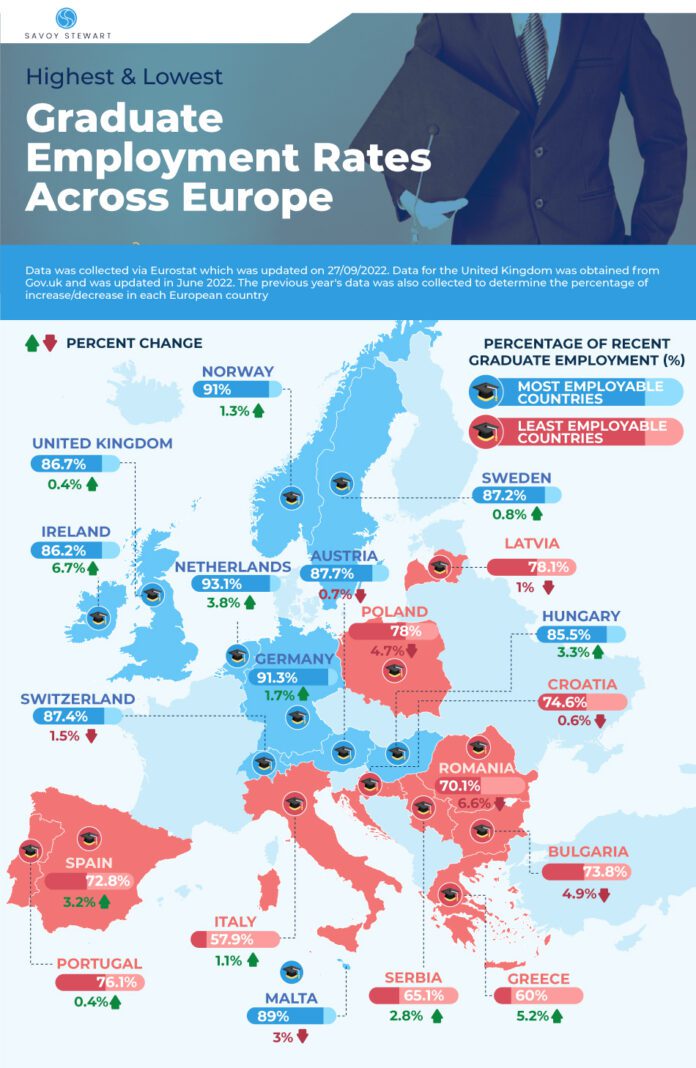UK ranked eighth best European country to work in for graduates this year with over 86% of recent graduate employment rate. This is a 0.4% graduate employment rate increase from 2020. Please see more details below.
With graduate schemes, and jobs seeing a seasonal peak in autumn, Savoystewart.co.uk was interested in finding out which European country has the highest graduate employment rate. To do so, they collated official data for 31 countries from Eurostat and Gov.uk, revealing the best country to work in for graduates!
Top 10 European Countries with the Highest Graduate Employment Rate
| Rank | Country | Percentage of recent graduate employment (%) |
| 1 | Netherlands | 93.1 |
| 2 | Germany | 91.3 |
| 3 | Norway | 91.0 |
| 4 | Malta | 89.0 |
| 5 | Austria | 87.7 |
| 6 | Switzerland | 87.4 |
| 7 | Sweden | 87.2 |
| 8 | United Kingdom | 86.7 |
| 9 | Ireland | 86.2 |
| 10 | Hungary | 85.5 |
Savoystewart.co.uk can reveal that the Netherlands currently has the highest graduate employment rate in Europe – at 93.1%. This is a 3.8% increase from 2020 where they positioned fourth among all European countries reviewed. As Europe’s logistic hub, the Netherlands offers plenty of graduate job opportunities in sectors such as manufacturing, logistics, and agriculture. Home to many widely known international companies, it is also an attractive place for international students who are seeking jobs in Europe.
Ranking second is Germany with an employment rate of 91.3% for recent graduates. The figure increased by 1.7% and showed a positive post-COVID employment recovery in the country. Known for being the biggest automotive market in Europe, it is not surprising to see that the most popular industries for graduates’ jobs include vehicle manufacturing, along with machinery, and electronics.
Norway came third with a 91.0% recent employment rate for graduates, 1.3% higher than the previous year. A recent survey also showed that the unemployment rate among recent master’s degree graduates dropped to the lowest since 2013. Industries such as healthcare, energy, tourism, and IT are all popular among graduates.
Bottom 5 European Countries
| Rank | Country | Percentage of recent graduate employment (%) |
| 1 | Italy | 57.9 |
| 2 | Greece | 60.1 |
| 3 | Serbia | 65.1 |
| 4 | Romania | 70.1 |
| 5 | Spain | 72.8 |
At the other end is Italy with graduate employment at 57.9%, the lowest among all European countries reviewed. Despite a big improvement (5.2%) in the graduate employment rate from the previous year, Greece ranked as the second worst country for graduates. Battling economic issues, Serbia and Romania follow with 65.1% and 70.1%, respectively. With a graduate employment rate of 72.8%, Spain is the fifth worst country for graduate jobs.
Top 5 European Countries with the Biggest Graduate Employment Rate Increase
| Rank | Country | Percentage of recent graduate employment (%) | % of Increase*(from the previous year) |
| 1 | Ireland | 86.2 | 6.7 |
| 2 | Lithuania | 79.9 | 5.4 |
| 3 | Greece | 60.1 | 5.2 |
| 4 | Netherlands | 93.1 | 3.8 |
| 5 | Hungary | 85.5 | 3.3 |
Ireland is the country with the highest increase (6.7%) in graduate employment rates across Europe. Their employment rate for graduates jumped from below 80% to over 86%, the biggest increase among all countries reviewed.
Receiving second and third are Lithuania at 5.4% and Greece at 5.2%. The Netherlands has seen the fourth highest increase in Europe while Hungary is fifth with 3.3%.
Please see the graphic for all regions ranking as attached. The full dataset ranked by the graduate employment rate and the rate increase can be found on Onedrive here.
We hope you found this information useful! If you publish the research included in this release, we kindly ask you to give a link credit to https://www.savoystewart.co.uk/. A linked credit allows us to keep supplying you with future content that you may find useful.

| [donate]
| Help keep news FREE for our readersSupporting your local community newspaper/online news outlet is crucial now more than ever. If you believe in independent journalism,then consider making a valuable contribution by making a one-time or monthly donation. We operate in rural areas where providing unbiased news can be challenging. |


















